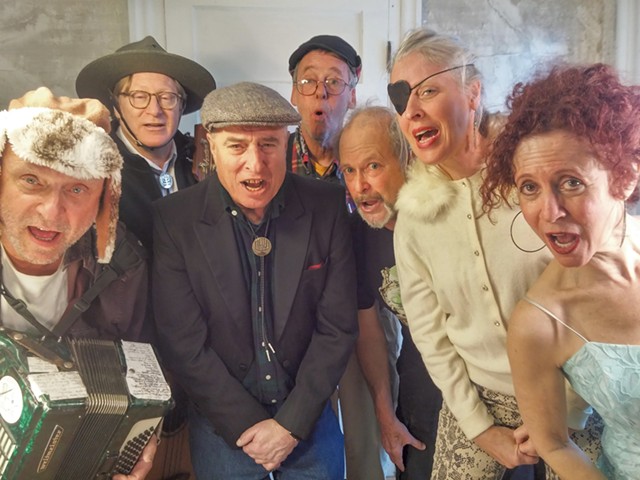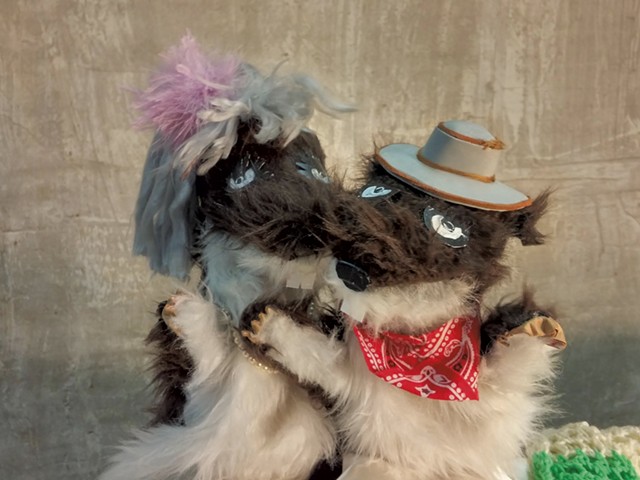
- Courtesy of David Schein
- L to R: David Klein, Jeff Tolbert, Donny Osman, Geof Hewitt, David Schein, Monica Callan, Dana Block
When they were dreaming up their latest play as a parable on global warming, HOTBALL cowriters David Schein and Geof Hewitt concocted what Al Gore might call an inconvenient conceit. "We figured, if it's about climate change, let's make the next 100 years happen in four days," explains Schein at a recent rehearsal at the Off Center for the Dramatic Arts in Burlington. And so they did.
HOTBALL, which opens a premiere two-week run this Friday, December 1, at the Off Center, is a morality play — or, perhaps more accurately, an immorality play — about global warming. The show's central premise is that Earth's climate has gone irrevocably haywire to the point where the unlucky denizens of Mulard, Vt., experience all manner of wacky weather — from a blizzard in June to a hellish heat wave — in roughly half a week.
"It's a director's nightmare to get the scene shifts, from cold and no power to amazingly hot moments later," says Hewitt.
But HOTBALL is far from a humorless screed on reducing carbon footprints and fossil fuel consumption. Aside from cataclysmic weather, the outlandish, satirical plot involves aging Vermont hippies, a really lousy rock band, and a decades-old mystery concerning the unsolved, and maybe unsavory, disappearance of a young woman.
And horny, confused squirrels ... played by puppets.

- Courtesy of David Schein
- The Squirrels
"It requires a little bit of suspension of disbelief," says Hewitt with a wink, summing up aspects of the farcical play's story arc.
Oh, and did we mention that it's a musical?
Hewitt and Schein, the latter of whom directs, have been friends and collaborators since meeting at the Iowa Writers' Workshop in the 1960s. The two have been working on HOTBALL for close to a decade. As they workshopped the story, they began writing songs alongside increasingly zany dialogue. Before long, they had enough material to produce a full-fledged musical.
"Originally, it was written for a rock band that could act," says Schein. In addition to the seven-member cast, the show features a full band, which performs its 12 songs.
"It's a bit of Kurt Weill meets the Holy Modal Rounders meets the Beach Boys," says Schein, explaining the origins of the music in HOTBALL. The score has "a bit of twang, too." Presumably, that's to justify the "apocalyptic jug band" designation in the production's press release — which, tellingly, bills the play as a "muSICKal."
"The song choices are really varied," says longtime local actor Donny Osman, a cast member who is also a classically trained circus performer and mime. "There's a waltz, a tango, a blues, country-western. I'm really impressed by the music."
Osman and other cast members, all local stage veterans, say they're equally impressed by the comedy's fanciful and freewheeling nature.
"It's so much fun to create a character that doesn't exist in a world that doesn't exist," says Jeff Tolbert.
"It's great to delve into that fantastical world and see what happens," adds actor Dana Block. "This isn't a story that's prescribed on any level, so it's a raw experience for me as an actor to not know," she continues. "It's just so out there, you have no choice but to say yes to every choice."
"In some ways, it's very reflective of what's going on today, but it's extremely satirical," says Schein when asked about the play's seemingly unwieldy thematic threads. "It's having a really good time with a terrible situation, which is a way of commenting on the real world."
He adds that, while the statement on global warming is obviously, well, global, a good deal of the play hits closer to home.
"There's also the backdrop of the aging hippies, the old Rainbow Tribe who moved up here from the city in the 1970s," says Schein. The play's protagonists, such as they are, are a trio of sixtysomething back-to-the-landers. In a certain light, the play could be read as a commentary on that generation's legacy in the state's most rural corners.
"We're continually alluding to that culture up in northern Vermont," Schein continues, noting that the trio's individual roles in the aforementioned legacy are murky. He gets serious for a moment, musing on the timeliness of certain themes in the play, from male guilt to climate change. "The themes are, in a way, all too current," he says.
Schein pauses. "And then there are the squirrels who kind of narrate the process," he says with a chuckle. The puppets serve as a sort of Greek chorus in the play. "And they're horny as hell and just don't know when to do it anymore."









Comments
Comments are closed.
From 2014-2020, Seven Days allowed readers to comment on all stories posted on our website. While we've appreciated the suggestions and insights, right now Seven Days is prioritizing our core mission — producing high-quality, responsible local journalism — over moderating online debates between readers.
To criticize, correct or praise our reporting, please send us a letter to the editor or send us a tip. We’ll check it out and report the results.
Online comments may return when we have better tech tools for managing them. Thanks for reading.